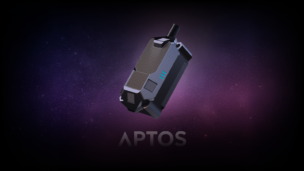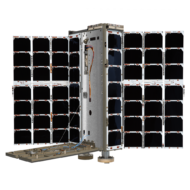Israeli startup WeSpace Technologies is angling to provide Israel’s official contribution to the Artemis program with its lunar hopper.
The company plans to launch its first craft in less than three years to begin providing “flying services on the Moon,” CEO Yifat Feffer told Payload.
Lunar hopping
WeSpace’s offering to the growing lunar economy is a small spacecraft, called a “hopper,” which can fly customer payloads over the lunar surface for simpler and more effective data collection.
Feffer said only 5% of the Moon’s surface is mapped to a level of detail that is actually practical for surface mining and infrastructure operations. “You don’t have practical information that you can [use to] go and bring the magnesium, you don’t know where the water ice exactly is, you don’t know the concentration,” she said.
The hopper is poised to change that. The autonomously-flown craft uses rocket propellant to hover over the surface of the Moon in the relative no man’s land between the surface and orbital altitude. The lander is designed to fly over obstacles and navigate craters and rifts where constant radio communication is impossible (and, coincidentally, where water ice can most likely be found).
Hop into the market: Israel is probing its domestic space industry for a contribution to the Artemis program, and WeSpace says it’s positioning itself for selection. The company has had conversations with Artemis project managers at NASA Ames, and believes its technology fits squarely into the mobility requirement under the agency’s Moon-to-Mars objectives.
WeSpace isn’t stopping with government procurement, though—it also sees a commercial market for its services. Once there is infrastructure in place for lunar mining, Feffer said she anticipates terrestrial mining companies will get in on the lunar economy, and she hopes WeSpace’s hoppers will provide the surface intelligence those companies will need.
Back to the beginning
Feffer founded the company in 2019 along with CTO Yigal Harel, former project manager for the Beresheet lunar lander at SpaceIL.
- Beresheet, which means “in the beginning” in Hebrew, crash-landed on the lunar surface in May 2019.
- Had the landing been successful, it would have made Israel the fourth country to land a craft on the Moon and represented the first commercial lunar landing (a milestone yet to be reached).
While ultimately unsuccessful, the energy and enthusiasm for the Beresheet inspired Feffer and Harel to pursue the idea for a lunar hopper. “If we can redo this methodology of working—going back to the Moon, finding a specific need, and struggling with it wisely—we can support and assist the market of deep space to be open, as it should be,” Feffer said.




